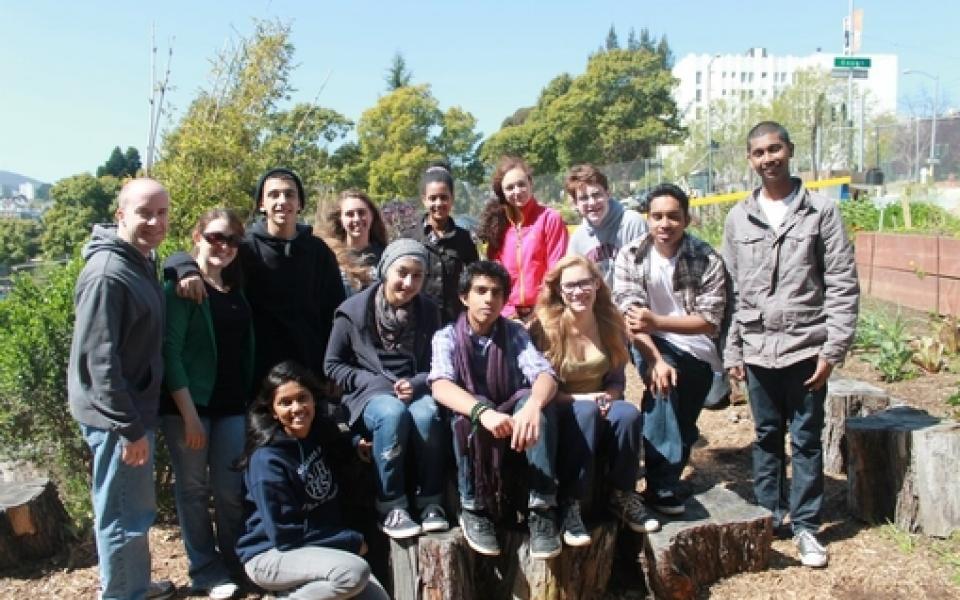
Young people from five Bay Area high schools – and a multitude of faith traditions – came together for a series of face-to-face dialogues in an event hosted by the United Religions Initiative’s Youth Leadership Program.
“We’ve done a lot of these training sessions throughout the world -- though never with people this young,” said URI Youth Program Coordinator Krithika Harish, who organized the event with fellow coordinator Matthew Youde.
More than 15 high school students gathered at the Happiness Institute, a non-profit community center in downtown San Francisco, for two days of creative reflection and self-discovery on March 31 and April 1, 2012.
“A lot of students who live and go to school in San Francisco never get out to Fremont or the East Bay,” Harish said. “So there was a real cross-pollination in terms of geography – and diversity in terms of culture and religion.
For Anna Shepard, a junior at The Bay School of San Francisco, the event was an opportunity to expand the boundaries of her world.
“I really wanted to meet new people, people who thought differently than I did, in order to understand the world better,” Shepard said. “I found that some of them had ideas that were very different than mine, but that their values were directly in line with my values. That was nice to see.”
“It’s great when diversity isn’t just theoretic – when it’s actually present for the students,” Harish added.
The students – many of whom were attending their first interfaith program – visited houses of worship and meditation throughout San Francisco. Those holy sites included the Massid Darussalam, the city’s largest mosque; Saint Cyprian’s, an Episcopal church in a low-income community; and the Sukyo Mahikari Center for Spiritual Development.
“It was really an introduction to different faith traditions,” Harish said. “The students were able to talk with a priest at the Episcopal church about the differences between the Episcopal and Catholic faiths, and have a really great discussion – they loved how knowledgeable he was. They were able to participate in afternoon prayers (at the mosque) and to learn about channeling light energy, and how that helps consciousness (from Sukyo Mahikari instructor Ken Kitatani).”
Participants also had the opportunity to discuss issues of faith and religious prejudice.
“The imam at the mosque (Imam Khalid Siddiqui) talked about Islamophobia, about what it’s like to be hated and feared for no reason,” Shepard said. “I had never heard (a Muslim person) talk before about how it had personally affected them. He opened himself up to make a personal connection with me – he wanted me to understand him as a man, and not just a Muslim. And that stuck with me.”
The students appreciated the opportunity to speak to religious leaders – and each other – with candor about sensitive subjects, Harish added. Nina Pine and Rachel Finn of Faiths Act Fellows, a group of young leaders working with the Tony Blair Faith Foundation, led a discussion of faith and service.
“One student talked about his skepticism with regards to light energy meditation,” Harish said. “And some of our Muslim students said they were surprised that the (Episcopal) priest was a gay man. They had thought that all Christians were against gay rights. It was an eye-opening experience for them.”
Former high school principal Clint Wilkins of the Heroic Imagination Project led the students through a leadership training workshop. The San Francisco nonprofit draws on the research of Stanford University psychologist Philip Zimbardo to provide tools and strategies anyone can use to create positive change by taking heroic action during critical moments.
“Before (the training session), I had thought that not everyone could be a leader,” Shepard said. “I now believe that being a leader is something that’s inherent in all of us, though everyone does it in a different way. But you have to know what your strengths are, when they’re applicable and when it’s better to let somebody else shine.”
In addition, URI Global Council member Anas Al-Abbadi led a dialogue skills training workshop. Al-Abbadi has organized more than 20 regional and international youth exchanges and seminars as director and co-founder of the Youth Spirit Center in Jordan.
The students also joined members of the Jewish congregation at Temple Emanu-El for voluntary service at The Free Farm, an urban farm and garden created on land within the city donated by the St. Paulus Lutheran Church. (To read more about that experience, read the JWeekly article here).
Each student came from one of several schools in URI’s Bay Area Network: the Averroes Institute, an independent Islamic school; The Bay School, an independent school that emphasizes the study of world religions; Leland High School, a public school in San Jose; Oakland International High School, a charter school focusing on recent immigrants to the United states; and Stuart Hall, a private Catholic school.
Harish and Youde hope to draw on the energy of the first training session to bring some of the young leaders into a new youth Cooperation Circle, and to encourage them to establish URI Chapters in their schools. In addition, the Youth Leadership Program plans to host a class on spiritual health and identity for students from the San Francisco International High School on May 23, and will be taking part in the annual Shinnyo-en Lantern Floating Ceremony in Honolulu, Hawaii over Memorial Day weekend.
